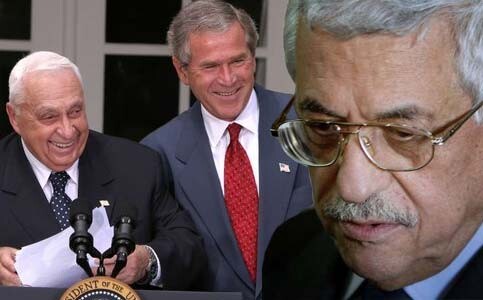Al Jazeera 21 January 2005

(Bush/Sharon: White House photo by Paul Morse. Abbas by Jamal Aroury)
There are serious concerns in Israel that the new Likud-Labour coalition government may not survive intense pressure from the extreme right within Likud, Ariel Sharon’s own party.
On Monday, 13 Likud lawmakers in the Knesset voted against the new coalition government, forcing the Israeli prime minister to rely on the centre-left Yahad and the Arab parties to bail him out from certain government collapse.
According to Ami Isseroff, an Israeli commentator, the split in Likud places the Sharon-Peres government in real jeopardy and might very well spell its end.
“Sharon’s coalition is hanging together by less than a thread. Even if he succeeds in getting Shas to join the government, he still won’t have a majority for peace, because Shas is not very flexible about peace,” he said.
No-return point
Isseroff predicted that the hard right would still win - even gain political muscle - in case early general elections were to be organised now.
Some Israeli officials have sought to play down the government’s predicament, arguing that not all the 13 Likud rebel lawmakers are against the “disengagement from Gaza”.
However, according to Yossi Verter, a Haaretz correspondent, the Likud rift is too obvious to gloss over:
“One thing is very clear: The internal revolt against Sharon has crossed the point of no return. It is no longer opposition to the disengagement; it is a direct challenge to Sharon’s leadership.”
Writing in Haaretz on 11 January, Verter argued that Sharon commanded the support of only 27 Likud Knesset members (or maybe 28 on a good day) out of the 40 Likud lawmakers in the Israeli parliament.
“Those who voted no-confidence in Sharon yesterday can’t easily return to the fold, as if nothing happened. The prime minister has a country, but no party,” he said.
Election in the air
Verter’s analysis cannot be dismissed as unduly pessimistic, for the Likud rebels - at least in theory - could bring down the government if they chose to.
This is also the view of Communication Minister Dalia Yitzhak - a senior Labour member.
“There is a feeling that we’ve already gotten into the frame of mind of elections. When I saw the Likud lawmakers yesterday (during the Knesset vote on the new government), I had this feeling that we can’t keep this wheel from turning,” she was quoted as saying.
The Likud rebels are led by Uzi Landau, a known hardliner who is fiercely opposed for ideological reasons to the notion of withdrawal from the Gaza Strip.
Landau repeatedly accused Sharon of working against the “will of the people” and betraying the “spirit and soul of the Likud”.
‘Non-Jews’ factor
Others are opposing the Likud-Labour government on barely concealed racist grounds.
One of the rebels was quoted on Monday as saying that “this government is legal but illegitimate” because it depends for its survival on non-Jews, a reference to Arab Knesset lawmakers.
The remarks were made shortly after the government, comprised of the Likud, Labour and the ultra-religious Ashkenazi party United Torah Judaism, was approved by a vote of 58-56, with six abstentions.
Notwithstanding the Likud rebels’ pressure, the real test facing the Sharon government will be the approval by the Knesset of the of the 2005 budget, which according to the law must be approved no later than 31 March, or else new elections will be called automatically.
“I think this is going to be Sharon’s litmus test. If he gets a majority of lawmakers in the Knesset to support the budget then, then the implementation of the disengagement plan will be easier,” Ira Sharkansky, a professor of political science at Hebrew University, told Aljazeera.net.
He stressed the condition of Sharon’s government is already precarious.
“I think Sharon is facing a very difficult situation. We really don’t know how he will overcome these problems. An early election might very well be the only alternative left,” he said.
Survival at stake
Against this backdrop of growing political uncertainty, what chances does the “Gaza disengagement” plan have of being implemented?
Palestinian political Hani al-Masri said, “We all know that the withdrawal, or more correctly redeployment, from Gaza is inextricably entwined with the survival of the Sharon government.
“If the extreme right succeeds in bringing the government down, then, yes, the disengagement plan will be a thing of the past.”
Al-Masri told Aljazeera.net it was unlikely that the election of the moderate Palestinian leader Mahmud Abbas will prompt the Sharon government to be more forthcoming.
“I think they (the Israeli government) might do something in terms of public relations and verbal pronouncements, but as regards tangible concessions on the ground, such as stopping settlement expansion, Sharon will give Abbas nothing,” he said.
“Sharon’s approach and strategy is to secure Washington’s support. Peace with the Palestinians is not on his mind,” al-Masri said.
“At the very best, it is an afterthought for him.”
Khalid Amayreh is a journalist based in the occupied West Bank. This article was originally published by aljazeera.net and reprinted on EI with permission.




